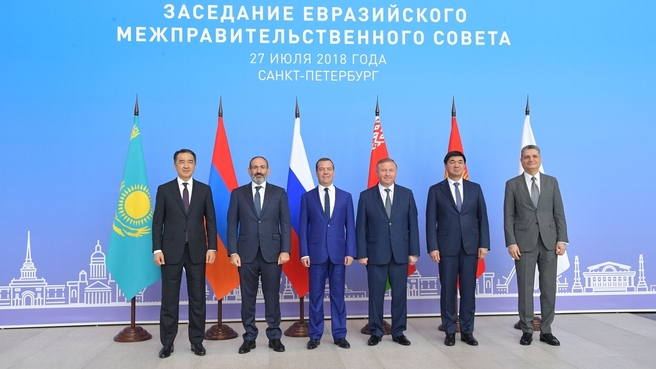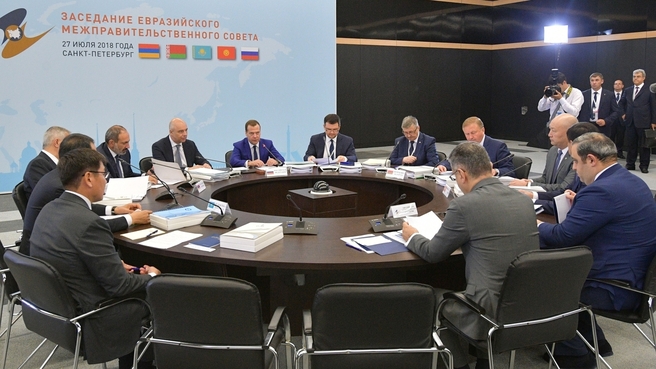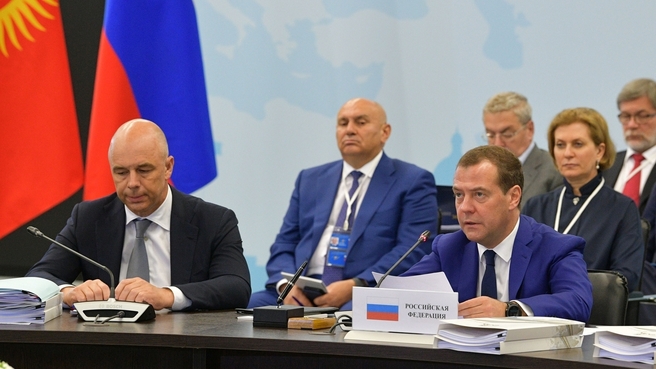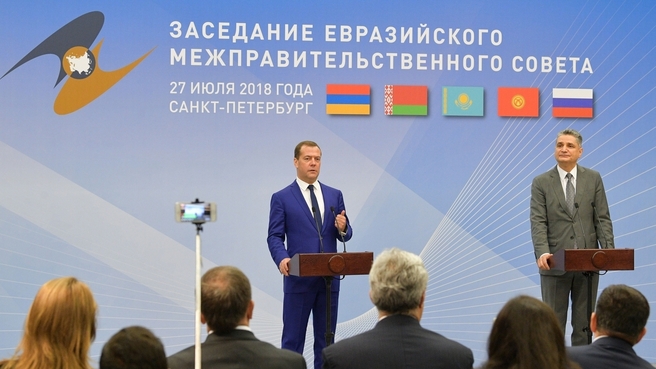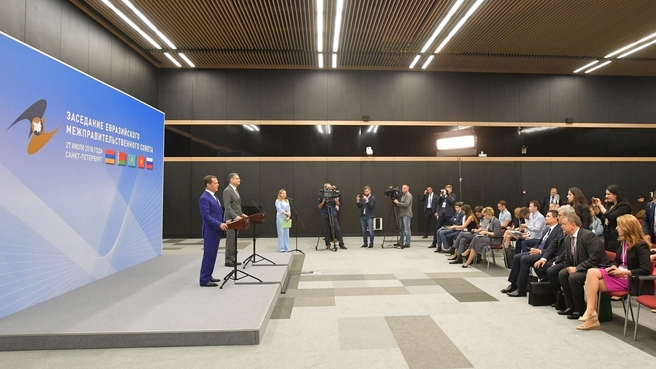Dmitry Medvedev: “In the first quarter of 2018, internal trade in the countries of the union and their foreign trade continued to grow (by 16.4 percent and almost 24 percent, respectively). Moreover, the participating states have increased their supplies to the union’s common market of not only raw materials, but also machinery, equipment, metals, metal products, chemical products, food and agricultural supplies.”
Dmitry Medvedev’s remarks at the meeting
Documents signed following the meeting of the Eurasian Intergovernmental Council
List of heads of delegations participating in the meeting of the Eurasian Intergovernmental Council:
Prime Minister of the Republic of Armenia Nikol Pashinyan
Prime Minister of the Republic of Belarus Andrei Kobyakov
Prime Minister of the Republic of Kazakhstan Bakytzhan Sagintayev
Prime Minister of the Kyrgyz Republic Mukhammedkalyi Abylgaziev
Prime Minister of the Russian Federation Dmitry Medvedev
Chairman of the Board of the Eurasian Economic Commission Tigran Sargsyan
Remarks by Dmitry Medvedev at the meeting of the Eurasian Intergovernmental Council:
I want to welcome all of you to St Petersburg to this meeting of the Eurasian Intergovernmental Council. The prime ministers of Armenia and Kyrgyzstan – Nikol Pashinyan and Mukhammedkalyi Abylgaziev – are participating in this format for the first time. We have already discussed many important matters with you today.
This is our second meeting under Russia’s presidency in the EAEU. Before that, we met in Almaty on February 2. We see our goals as fully implementing all the agreements that have been reached by our union both at the level of heads of state and at the level of heads of government, and setting new goals.
Retrospective
-
Meeting of the Eurasian Intergovernmental Council, 2 February 2018
-
Meeting of the Eurasian Intergovernmental Council, 25 October 2017
-
Meeting of the Eurasian Intergovernmental Council, 14 August 2017
-
Meeting of the Eurasian Intergovernmental Council, 26 May 2017
-
Meeting of the Eurasian Intergovernmental Council, 16 November 2016
-
Meeting of the Eurasian Intergovernmental Council, 27 October 2016
-
Meeting of the Eurasian Intergovernmental Council, 12 August 2016
-
Meeting of the Eurasian Intergovernmental Council, 20 May 2016
-
Meeting of the Eurasian Intergovernmental Council, 13 April 2016
-
Meeting of the Eurasian Intergovernmental Council, 8 September 2015
-
Meeting of the Eurasian Intergovernmental Council, 29 May 2015
-
Meeting of the Eurasian Intergovernmental Council, 6 February 2015
The group of five Eurasian states is working successfully and is gradually revealing its capabilities. In the first quarter of 2018, internal trade in the countries of the union and their foreign trade continued to grow (by 16.4 percent and almost 24 percent, respectively). Moreover, the participating states have increased their supplies to the union’s common market of not only raw materials, but also machinery, equipment, metals, metal products, chemical products, food and agricultural supplies.
All this suggests that intra-union trade flows are becoming more balanced, and the manufacturing industry and agriculture of our countries are getting new opportunities for expanding production and creating new jobs.
We plan to consistently work to achieve the goals set by our heads of state, which are to ensure economic growth rates of at least 2 percent and maintain low inflation. This is enshrined in the Basic Guidelines for Macroeconomic Policy of the EAEU Member States for 2018-2019.
Developing and implementing digital technology is one of the key areas of our cooperation. We are all aware of its importance for building the economy of the future. Coordinated efforts to digitize the economic space are among the Russian presidency’s priorities.
The EAEU now has a regulatory framework for launching the first digital projects in priority areas. For our part, we came up with a number of initiatives in the sphere of e-commerce, goods tracking technology and creating transport corridors and industrial cooperation. We have just discussed all this at our restricted-format meeting. I consider it important that these projects represent not only states, but businesses as well. This is the only way for these projects to stay alive.
We continue to pay special attention to improving supranational regulations. We also discussed in a fairly detailed manner creating, in our union, common markets for oil and oil products, and the natural gas market.
We must ensure a non-discriminatory and transparent environment for doing business. In general, we will need to do an additional work to remove barriers that stand in the way of creating common EAEU markets. We agreed on this during our restricted-format meeting as well. We formed an expert group to eliminate barriers, which includes representatives of the business communities of our countries. Their experience and professionalism will be put to good use here.
Overall, we are making good progress in these areas. The Agreement on Marking Goods with Means of Identification was signed earlier this year. I look forward to the completion of all necessary procedures by the participating states, so that the document may come into force as soon as this year. As you may be aware, we plan to create, by the end of this year, a full-cycle system in Russia from customs clearing the goods to retail outlets selling them. I suggest extending this mechanism to the entire union as soon as possible. The benefits are clear and include establishing effective state control, protecting consumers, and creating a favourable environment for doing business.
Colleagues, finding the appropriate response to all manner of trade restrictions imposed by our foreign partners remains high on the list of our priorities.
Of course, matters that affect the security sphere are in the national area of responsibility. We exercise our right to protect our economic security. The national authority to use retaliatory restrictive measures is enshrined in international law and the WTO rules. All EAEU members have it.
Nevertheless, it is important to map out collective steps if we ever have to uphold our common trade and economic interests. This can not be ruled out, as the latest developments clearly show, including all sorts of ongoing disputes in different regions with the participation of various countries and unions of countries.
With this in mind, I would like to point out that we remain open to cooperation. We want our economic relations with our foreign partners to be built on the well-known win-win principle, which is beneficial for all the participants.
In this context, concluding the EAEU-Iran interim free trade agreement and the EAEU-China agreement on trade and economic cooperation in May were important events. The negotiation process was long and difficult. Our constructive efforts have led us to mutually acceptable agreements. Now, the participating states must promptly carry out the procedures that are necessary to bring these decisions into force.
It is also worth noting that, by decision of the Supreme Eurasian Council, the provision on EAEU observer state status was approved. This status was granted to Moldova.
We sincerely welcome the willingness to expand mutually beneficial cooperation with the countries of our union. The Moldovan representative can now come and start a dialogue with the Eurasian Economic Commission.
Documents signed following the meeting of the Eurasian Intergovernmental Council:
Instruction on progress in implementing the digital agenda of the Eurasian Economic Union;
Instruction on progress in executing Instruction No. 2 of the Eurasian Intergovernmental Council of 2 February 2018;
Instruction on executing Instruction No. 4 of the Eurasian Intergovernmental Council of 2 February 2018;
Instruction on progress in implementing Instruction No. 3 of the Eurasian Intergovernmental Council of 2 February 2018;
Instruction on access for exporters from the Eurasian Economic Union member states to services provided by Russia’s seaport infrastructure;
Instruction on cancelling Resolution No. 90 of the Board of the Eurasian Economic Commission of 29 May, 2018 on using anti-dumping measures by imposing an anti-dumping duty on herbicides originating in the European Union and imported into the customs area of the Eurasian Economic Union;
Directive on the progress of work on the draft protocol to amend the Treaty on the Eurasian Economic Union of 29 May 2014;
Instruction on the draft resolution of the Supreme Eurasian Economic Council on forming the common gas market of the Eurasian Economic Union;
Directive on the progress of work to create a body to investigate flight accidents and major incidents;
Instruction on using collective measures to protect economic interests of the EAEU member states in the wake of unilateral protectionist measures against member states introduced by foreign states;
Instruction on amending the Treaty on the Eurasian Economic Union of 29 May 2014;
Directive on the annual report by the Eurasian Economic Commission on monitoring the assessment of the regulatory impact of the Eurasian Economic Commission’s draft resolutions in 2017;
Directive on crediting and distributing import customs duties among the budgets of the Eurasian Economic Union member states in 2017;
Directive on forming a high-level working group on integration issues in cooperation and import substitution in priority industries;
Directive on submitting to the Supreme Eurasian Economic Council names of candidates to the Council and the Board of the Eurasian Economic Commission;
Directive on the time and place of the next meeting of the Eurasian Intergovernmental Council.
News conference by Dmitry Medvedev and Chairman of the Board of the Eurasian Economic Commission Tigran Sargsyan
Excerpts from the transcript:
Question: Good afternoon, Mr Medvedev. Anatoly Kurmanaev, Wall Street Journal.
Today, you discussed plans to create a single gas market. How might that look? What other concrete measures are planned to be able to proceed with EAEU economic integration? What kind of measures could boost the appeal of the EAEU transport corridor for Chinese exporters?
Dmitry Medvedev: I will start with further steps to promote integration. I believe all the decisions that we reviewed today are designed to strengthen integration within the Eurasian Economic Union. Whatever you take – be it the digital agenda, or things related to the goods tracking system, or the introduction of fast-track procedures and various services that we offer to businesses – all of that reinforces our integration and makes working within the Eurasian Economic Union more appealing. Let's start with the fact that we have significantly boosted the scope of this cooperation recently. My fellow heads of government and I cited these numbers in our respective remarks. This is really so, and all of it stems from integration.
So, integration will continue to expand across all these areas, including digital, energy, biotechnology, pharmaceuticals, high-tech industries in general, logistics and agriculture.
A colleague of mine once said that while the European Union was born from the union of coal and steel (European Coal and Steel Community), our Eurasian Economic Union is largely an oil and gas union. This, of course, is an exaggeration, but in many respects it was originally so, because the participating countries wanted clear, transparent and predictable rules for trading in oil and gas and a single oil and gas market. Of course, these goals remain on the agenda, and we are on our way to achieving them.
Today, we discussed ways to create a gas market for quite a long time, to be frank. Not all of the approaches have been agreed by the countries, including transportation and tariffs, that is gas transportation rates. However, we agreed to brainstorm. I just signed, as did my fellow prime ministers, a resolution by the intergovernmental council on holding consultations first at the level of energy ministers. Later, I think, our commission will work closely with our colleagues who engage in these matters, and then we will convene an intergovernmental council meeting.
I think that this can become one of the central, bigger themes. That is, we could have a serious discussion rather than breeze through it in five or fifteen minutes. These decisions are way too important and fundamental. However, we need to keep moving in that direction. When we were creating our union, we agreed that this will be one of our goals.
There are certain deadlines, and we are treating these deadlines with all seriousness, so we will try to agree on these variables.
With regard to improving the appeal of the Eurasian Economic Union’s logistical capabilities, including for our Chinese partners, you may be aware that we have already agreed with them all practical aspects of work as part of a special format between the Eurasian Economic Union and the People's Republic of China. This is not yet a free economic area, or a special economic area, or a free trade area, but a first tool in the process of merging our capabilities.
You may be aware that we agreed with our Chinese partners to develop cooperation between the EAEU and the well-known Belt and Road project. A corresponding roadmap is available, and all the necessary directives to this effect have been issued.
Clearly, transport corridors in the EAEU countries are extremely lucrative, even just in terms of saved time. If we picture such a corridor which, for example, would connect Beijing to Europe, then, according to economists, the transit time can be much shorter than other routes. However, to do so, we need to build the infrastructure. There are such projects. They are very big and include high-speed rail, including cargo rail transport connecting Beijing, the EAEU countries and Europe.
This will require significant amounts of funding. However, if we can agree on operational principles, such a project could be a mega-project in the sphere of logistics and transport between our countries. I'm not even mentioning the significance and benefits for residents of different regions of the EAEU countries.
We will continue to work on this.
Question: Vladimir Orekhov, Rossiya television channel, Vesti St Petersburg. I have a question for both Mr Medvedev and Mr Sargsyan. What decisions were made during the meeting regarding implementation of the digital agenda? What high-profile issues were discussed and what decisions were made?
Tigran Sargsyan: First, I would like to point out that our discussion is based on the understanding that we must pursue a coordinated policy on the digital revolution. If each country goes ahead with its own policy, it will lead to more barriers and obstacles on the way to creating common markets. This is understood. Now, it is important to start working on the mechanisms for conducting coordinated policy.
We agreed that we should strive to ensure the interoperability of our projects. Second, we must strive to create common digital transformation standards. Third, there must be a clearly structured management system in place, so that we can coordinate the positions of national governments.
Today, the prime ministers instructed us to work on issues that are extremely important now.
First, today we discussed ways to ensure goods are tracked when they cross our borders, including goods from third countries. We are about to launch a pilot project, which is an important agreement in principle. Under this pilot project, we will develop more specific mechanisms and decide on ways to deepen this tracking pilot project. All heads of government agree that this is a mandatory part of the digital transformation.
For our pilot projects to be effective, it is necessary to create an ecosystem, including digital sandboxes, as they make it possible to implement pilot projects, and then assess these projects’ upsides and downsides. So, if we are able to test everything as a result of these projects, we can use this tool to see all our projects and initiatives to completion. To date, we are working on 25 initiatives. We are now doing R&D work on three of them as decided by the council. Once the research is complete, the council will decide on their future.
So our digital programme, our agenda is entering a stage of active implementation.
Dmitry Medvedev: I can only add a few things because Mr Sargsyan was right on point.
At the limited attendance meeting we discussed whether digital is a separate project. No, digital is essentially a new platform. This is the foundation for resolving the most diverse problems. This is exactly why it is a cross-industry project if we can still call it a project.
In other words, digital is required in all projects that we are now carrying out both in our national economies and in the Eurasian Economic Union. This is what we discussed at length – who should organise this work and where the office should be located. These issues are also on today’s agenda.
I believe that owing to the universal character of the digital platform for the development of our economies as a whole, we must do this all together, realising, as it was correctly said, that it will not work to have different approaches here. The approaches must be absolutely the same. They must be uniform. Only in this case we will have a common language of communication, and a common code of communication, both in the literal and figurative sense of the word.
There is also a whole number of related issues that were mentioned as well. Indeed, regulatory sandboxes are also very important. They allow us to work on development models for different services and regulatory rules. Online commerce issues were also discussed because we need common regulatory rules for it as well. We have a common economic space, so the regulatory rules must be the same. We also reviewed a number of other issues.
We will work on all this by all means. Once again, this is an agenda that unites all of us. This is a common platform and this is why it is extremely important.
Tigran Sargsyan: Mr Medvedev, with your permission I would like to make a statement that I consider very important. It is on the issue that we discussed today, notably, on the anti-dumping inquiry regarding herbicides. You know, the commission received a claim from herbicide producers from Belarus, Kazakhstan and Russia about the dumping practices of some major European companies in this market. The inquiry confirmed the concerns of our producers. This is a fact and our European competitors resorted to dumping in our market.
We discussed this issue today. The commission established, in accordance with the law and the union treaty, that dumping has indeed taken place. We agreed (despite our Kazakh colleagues’ veto of this board decision) that the commission will continue working with European producers to create equal competitive conditions and prevent distortions in our market. It is necessary to get this information through to both producers and consumers so as to prevent some dishonest competitors from fooling our five countries in order to get some extra-market advantages in our common market.
Dmitry Medvedev: Since this issue is brought up, I will also say that our union will be worth something only if it can defend itself. Anti-dumping inquiries are protective measures. These are measures to counter unfair competition. We must learn to use them because all too often we are stifled with such measures, and anti-dumping inquiries are made into practically all states. We must learn to do this as well. I think these are weapons that must always be ready for use. Only in this case will we be able to uphold our national interests and the interests of all member states of the Eurasian Economic Union.
